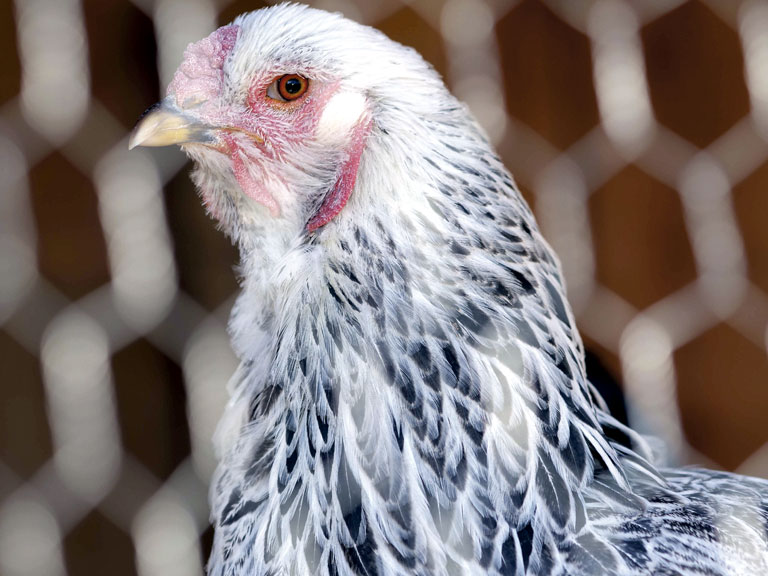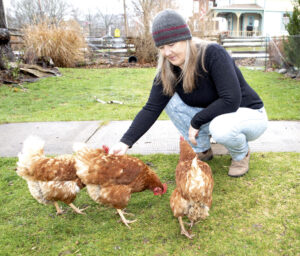County News
Lay away plan

Council passes backyard hen bylaw amid squawking
After a strident and energetic outcry by backyard hen enthusiasts across the County, council reversed its decision to bar the raising of chickens in urban areas and has now passed a bylaw allowing the practice. Town dwellers can now have up to six hens and rural residential can have as many as 10, and roosters are not permitted. The ruffled feathers started last year after a noise complaint in a rural area led to bylaw officers ordering a homeowner to remove their flock, which included a rooster—the trigger for the complaint. It turns out that raising backyard hens was non-compliant, but Councillor Kate MacNaughton says the reaction was too blunt. “There needed to be a way for bylaw [officers] to step their response more appropriately. In that particular case the complaint related to the rooster and not the hens,” she says. It turns out that the 2015 Secondary Plan supports urban agriculture, including backyard hens, but the relevant bylaw had not been enacted. The first draft was created early this summer and received overwhelming support from the public and from council. “I considered it to be a very small housekeeping bylaw that was just to clean things up and bring the backyard chickens that we have into compliance, but it turned into a much bigger issue,” says MacNaughton. During the ratification meeting in late October, one councillor raised the spectre of avian infection spreading from urban backyards to commercial chicken producers. Many councillors reversed their support, and the bylaw died on the table.

Jennifer Cobb tends to her hens in her front yard on Wellington Main Street.
The response from the public was swift. A Facebook group formed to galvanize support, starting a petition that quickly received over 500 signatures, as well as orchestrating a letter writing campaign to every County councillor. When the matter came up again on November 24, the bylaw passed easily. Jennifer Cobb of Wellington was one of those who made her voice heard. She started raising backyard hens in mid-March when the COVID-19 pandemic hit. “I grow micro-greens, I have a really good vegetable garden come summer, I have nut trees. But I really don’t have any source of protein, and—being very imaginative—I thought we’d be in for a really long lockdown and it would be good to have a source of protein,” she says. She knew raising urban hens was a bit of a grey area in terms of allowability, but a number of neighbours had been doing it already for years. It was permitted under the old Wellington Village bylaw, but not updated at amalgamation. When the proposed bylaw was canned at first reading, she contacted Councillor MacNaughton, and joined the Facebook group. Their efforts paid off, and now she has three law-abiding hens, Hazel, Mabel and Rosie—though it’s difficult for a layperson to tell them apart—in her yard that provide her with a steady supply of eggs, with enough to give to her neighbours.
The bylaw prohibits the sale of eggs or meat. Cobb says that raising hens is fairly straightforward. “You need to provide for their safety, so my yard has fencing around the lower level, and that means they don’t run out on the road. And I need to make sure they have water. I have a coop in the back that they go into every night. I make sure the door is locked so animals can’t get in. It’s not a lot of work. I’ve had tons of comments, and most people are really happy to see them and I’ve had no complaints. In the early stages of COVID, I had a lot of neighbours with little kids out of school who would come frequently, if not daily, to visit the chickens.” The hens make a lot of high quality compost that ends up in Cobb’s vegetable garden, and she says the eggs are very tasty. “I have one hen that’s an overachiever, and often lays a double-yolk egg, and that’s almost twice the size of a regular egg,” she adds.
Councillor MacNaughton says that backyard hens offer a way to provide food security, and is a great education opportunity for everyone. While she does not have hens now, she did have a flock when her daughter was younger. “For me, it was really fun, and they turned out to be a true pleasure. They are so charming, and I learned a lot about a different species just by observing how they interact. They are also good company and I found them quite soothing,” she says. “It was also an extraordinary education for my daughter, who learned how to care for other animals, why we care for other animals, and what that relationship is when we provide care and housing and food, and they give us food in exchange, and how that has to work in a respectful way. She knows how to grow her own food, and that’s an essential skill that everybody should have. The educational opportunities for a child to learn how to manage animals, how to manage food production, and how to respect the process is extraordinary. That’s an opportunity that only comes with hands-on experience.”

Comments (0)